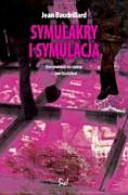Dzieło

Symulakry i symulacja
Jean BaudrillardJean Baudrillard słynne cytaty
Źródło: Spisek sztuki, Warszawa 2006
Źródło: Gra resztkami, w: S. Czerniak, A. Szahaj, Postmodernizm a filozofia. Wybór tekstów, Warszawa 1996.
Źródło: Symulakry i symulacja, Warszawa 2005
Źródło: Ameryka, Warszawa 1998.
Źródło: Symulakry i symulacja, Warszawa 2005.
Jean Baudrillard: Cytaty po angielsku
“We live in a world where there is more and more information, and less and less meaning.”
Źródło: Simulacra and Simulation
“There is no aphrodisiac like innocence.”
Źródło: 1980s, Cool Memories (1987, trans. 1990), Chapter 5
New York (p. 15)
1980s, America (1986)
Kontekst: Yet there is a certain solitude like no other - that of the man preparing his meal in public on a wall, or on the hood of his car, or along a fence, alone. You see that all the time here. It is the saddest sight in the world. Sadder than destitution, sadder than the beggar is the man who eats alone in public. Nothing more contradicts the laws of man or beast, for animals always do each other the honour of sharing or disputing each other’s food. He who eats alone is dead (but not he who drinks alone. Why is this?).
"The Precession of Simulcra,MÖBIUS - SPIRALING NEGATIVETY
1980s, Simulacra and Simulation (1981)
“Forgetting extermination is part of extermination”
Holocaust
1980s, Simulacra and Simulation (1988)
Kontekst: Forgetting extermination is part of extermination, because it is also the extermination of memory, of history, of the social, etc. This forgetting is as essential as the event in any case unlocatable by us, inaccessible to us itn its truth. This forgetting is still too dangerous, it must be effaced by an artificial memory (today, everywhere, it is artificial memories that effect the memory of man, that efface man in his own memory). This artificial memory will be the restaging of extermination - but late, much too late for it to be able to make real waves and profoundly disturb something, and especially, especially through medium that is itself cold, radiating forgetfulness, deterrence, and extermination in a still more systematic way, if that is possible, than the camps themselves.
“The secret of theory is that truth does not exist.”
Źródło: Fragments: Cool Memories III, 1990-1995
“One day, we shall stand up and our backsides will remain attached to our seats.”
1980s, Cool Memories (1987, trans. 1990)
The Precession of Simulcra
1980s, Simulacra and Simulation (1981)
New millennium, Photography, or the Writing of Light, (2000)
Źródło: 1980s, The Ecstasy of Communication (1987), p. 65
Canadian Journal of Political and Social Theory 15 (1987) "When Bataille Attacked the Metaphysical Principle of Economy"
1980s
Vanishing Point (pp. 9-10)
1980s, America (1986)
“When the real is no longer what it was, nostalgia assumes its full meaning.”
The Precession of Simulcra, The Divine Irreference Of Images
1980s, Simulacra and Simulation (1981)
“Distinctive signs, full signs, never seduce us.”
Źródło: 1980s, The Ecstasy of Communication (1987), p. 59
The Precession of Simulcra, The Hyperreal and the Imaginary
1980s, Simulacra and Simulation (1981)
New millennium
"The Precession of Simulcra,MÖBIUS - SPIRALING NEGATIVETY
1980s, Simulacra and Simulation (1981)
